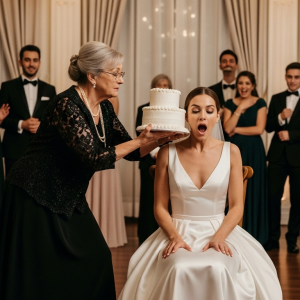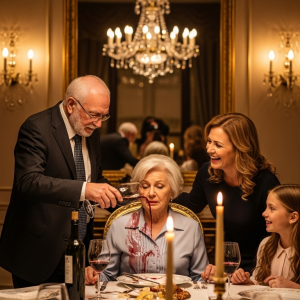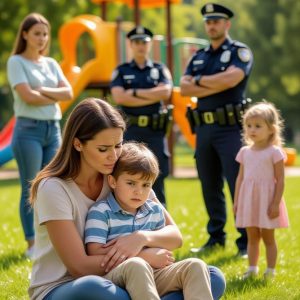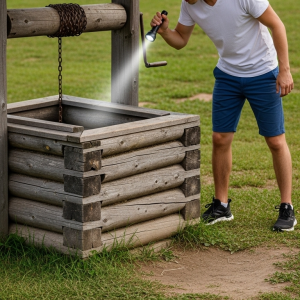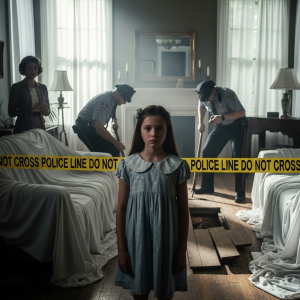The park was breathing. It was a slow, contented rhythm, the kind you only find on a perfect, sun-drenched Sunday afternoon. The air, warm and thick with the scent of cut grass and popcorn, carried the laughter of children chasing pigeons across the wide, paved plaza. It was a portrait of ordinary peace, a scene so tranquil it felt almost sacred.
My name is Alex, and I was there with my friend, Sarah, enjoying the simple gift of a day off. We sat on a familiar wooden bench, sipping iced coffee and talking about everything and nothing. The world felt soft around the edges, a gentle escape from the rigid demands of the work week.
It was amidst this gentle chaos that I first saw them. A man in a crisp, but clearly well-worn, military uniform, walking with a ramrod-straight posture that seemed at odds with the park’s relaxed atmosphere. Beside him, moving in perfect, silent unison, was a magnificent German Shepherd. The man’s rucksack looked heavy, as if packed with more than just supplies, but with the weight of a long journey.
They weren’t just a man and his dog; they were a single, cohesive unit. His hand would occasionally drop to rest on the dog’s head, a brief, grounding touch, and the animal’s gaze would constantly flick from the path ahead to its master’s face, a silent, ceaseless check-in. There was an invisible tether of loyalty and shared history connecting them, a bond so palpable you could almost see it shimmer in the air.
They walked steadily in our direction, a silent island of purpose in a sea of leisure. I remember thinking he looked exhausted, a deep weariness etched into the lines around his eyes that the crisp uniform couldn’t hide. Sarah was mid-sentence when my attention was completely snared by them. Something felt… off.
The soldier’s gait faltered for just a second, a barely perceptible stumble that he instantly corrected. But then it happened again. His shoulders slumped, and his forward momentum ceased. He swayed on his feet like a great tree fighting a losing battle against the wind. The dog stopped instantly, pressing its body against his leg as if to offer support.
There was no sound, no cry for help. Just a slow, horrifying surrender. The soldier staggered one final time, his eyes rolling back in his head, and then he collapsed. He didn’t fall so much as fold, crumpling to the hard pavement with a sickening, final thud that cut through the park’s happy hum. He lay utterly still.
For a heartbeat, the world froze. Then, instinct took over. I shot to my feet, Sarah beside me, both of us surging forward with a half-dozen other strangers. Our collective impulse was singular: help him. But we were stopped dead in our tracks.
In the second it took for us to react, the German Shepherd had transformed. One moment, it was a loyal companion. The next, it was a sentinel, a furious guardian. It planted its feet squarely over its master’s chest, lowered its head, and from deep in its throat came a growl that was not just a warning, but a promise of violence. Its teeth were bared, and the fur along its spine stood up like a row of daggers. The message was brutally clear: stay back.
The cheerful atmosphere of the park shattered. Laughter died in throats, replaced by gasps of alarm. A circle of onlookers formed, a hesitant, fearful perimeter around the fallen soldier and his fierce protector. The dog was a statue of controlled fury, its eyes burning with a desperate, intelligent light as it scanned the ring of human faces.
“Someone do something!” a young man shouted, gesturing uselessly.
“Is he breathing?” a woman asked, her voice trembling.
A man, bolder than the rest, took a tentative step forward. “Easy, boy,” he said, his hands held up in a placating gesture. The dog’s response was immediate and terrifying. It lunged forward—not to attack, but to close the distance, its bark exploding like a gunshot. The man stumbled backward, his face pale with shock.
Panic began to ripple through the crowd. Whispers turned to fearful murmurs. “It’s a vicious animal!” someone yelled from the back. “Animal control! Call them before it hurts someone!” I pulled out my phone, my fingers fumbling as I dialed for an ambulance, trying to explain the impossible situation to the calm voice on the other end. “There’s a man unconscious,” I said, “but… but his dog won’t let anyone near him.”
The minutes stretched into an eternity, each one a fresh wave of anxiety. The soldier remained motionless, a fallen monument at the center of a storm he was oblivious to. The dog continued its vigil, circling his body, a constant, low growl rumbling in its chest. It was a standoff born of love and fear, and no one knew how to break it.
Then, a new voice cut through the noise, calm and firm. “You are all scaring him.”
An elderly woman with kind eyes and a steady presence stepped forward from the crowd. She moved with a quiet confidence that commanded attention. “He is not vicious,” she stated, her voice carrying an authority that silenced the panicked whispers. “He is afraid. He is protecting the only thing he has in the world. We must show him we are not a threat.”
She was the first to break the fearful stalemate. Mrs. Petrov, as I later learned her name was, moved slowly, deliberately. She didn’t approach head-on, but from the side, avoiding a direct, challenging gaze. She knelt down about ten feet away, her movements smooth and unthreatening.
“You’re a good boy,” she crooned, her voice soft and rhythmic. “You are a very good boy, and your friend needs our help. We won’t hurt him. We promise.”
The dog’s menacing growl softened, ever so slightly, into a low, mournful whine. It remained tense, a coiled spring of muscle and nerve, but its frantic aggression subsided into watchful suspicion. Its gaze never left the woman, but the burning fury was replaced by a look of profound distress.
Emboldened by her courage, a young man with a water bottle and I slowly followed her lead, kneeling a safe distance away. The ambulance had been called, but this was the first, critical step. We had to earn the right to help. The dog watched us, its head cocked, its mind seeming to process a thousand calculations of risk and intent.
When the paramedics finally arrived, their uniforms and bulky equipment threatened to undo all of Mrs. Petrov’s progress. The dog’s growl returned, deeper this time. But the lead paramedic, a graying man with a calm, seen-it-all demeanor, stopped his team. He saw the scene not as a threat, but as a puzzle.
He noticed the small, embroidered patch on the dog’s collar, one I hadn’t seen before. “He’s a service animal,” he said quietly to his partner. “This isn’t aggression. It’s a trained response.” He then did something unexpected. He spoke to the dog, not as an animal, but as a soldier. “Stand easy, son,” he said, his voice respectful. “We’re here to help your CO.”
As they got closer, we could hear the fallen soldier muttering, his voice slurred and faint. He was saying a name. “Liam… hold on, Liam…” And then, a location. “Kandahar… the ridge…”
The paramedic’s eyes flickered from the soldier’s face to the heavy rucksack. He saw how the dog kept nudging the bag with its nose, guarding it just as fiercely as it guarded the man. A sudden, piercing understanding dawned on his face.
“Alex,” he said, looking directly at me, as I was closest. “His rucksack. Unzip the small side pocket. Slowly.”
My heart hammered against my ribs. Under the watchful, trembling eyes of the dog, I crawled forward and did as he asked. My fingers found the zipper. Inside, resting on top of a neatly folded uniform, was a tri-folded American flag and a set of silver dog tags. The name stamped on them was not the one on the soldier’s uniform.
The paramedic took the items from my hand and held them up for the dog to see, to smell. “We’ve got him, Zeus,” he said, reading the name on the service animal’s tag. “We’ve got Liam. The mission is safe.”
And then, the shocking truth settled over the silent crowd. The dog hadn’t just been protecting its master. It had been protecting a promise. It was guarding the last remains of a fallen comrade. The soldier on the ground hadn’t just collapsed from exhaustion; he had collapsed under the crushing weight of his grief and his sacred duty. The dog was his honor guard.
With that single act of understanding, the standoff was over. The German Shepherd, Zeus, let out a long, shuddering whine and finally sat back on its haunches. It allowed the paramedics to work, its eyes never leaving their hands, watching every injection, every vital check, with an intensity that was heartbreaking.
They carefully lifted the soldier onto a gurney. When they began to wheel him away, Zeus moved to follow. A paramedic immediately opened the ambulance door. “He rides with us,” he said, a command that no one would dare question. The dog leaped inside without hesitation, lying down on the floor beside the gurney, its head resting near its master’s hand.
The ambulance doors closed, and it pulled away, its siren silent out of respect. We, the strangers in the park, were left standing in a profound, stunned silence. The sun was still shining, the children were still playing in the distance, but the world felt different now, imbued with a gravity it hadn’t possessed just an hour before.
Mrs. Petrov came to stand beside me, her gaze on the empty space where the ambulance had been.
“Remember what you saw here,” she said softly. “That dog was not keeping us away from him. He was keeping the world away from a soldier who was still fighting a battle. For some, the war never truly ends.”
We never learned the soldier’s name, or Liam’s story. But none of us who were there will ever forget that day. We saw more than just a man collapse. We saw the invisible wounds of war, the crushing burden of a promise kept, and the unwavering, ferocious loyalty of a four-legged sentinel who stands guard not just over a life, but over a soul.
The ambulance disappeared around a bend, its flashing lights painting the trees in brief, urgent strokes of red and blue before vanishing completely. The spell was broken. The crowd, a collective body that had held its breath, finally exhaled. People began to disperse in small groups, their voices a low murmur of disbelief and wonder. They were dissecting the story, packaging the raw emotion of the last hour into an anecdote they could share later.
The park began to reclaim its rhythm. The cheerful shouts of children returned, the casual chatter of strangers resumed. But for me, the sound was different now. It was a film with the audio slightly out of sync, a familiar scene that had been irrevocably altered. The golden afternoon light, once so warm and comforting, now seemed to cast long, somber shadows.
Sarah put a hand on my arm. “Alex, are you okay? Let’s go home.” Her voice was gentle, but I couldn’t move. I felt rooted to the spot, my gaze fixed on the empty patch of pavement where the soldier had fallen. The image of those silver dog tags, the name—Liam—was seared into my mind. It felt wrong to simply turn my back and walk away, to let the credits roll on a story that felt so profoundly unfinished.
Mrs. Petrov, who had lingered nearby, seemed to understand. She gave me a small, knowing smile. “An event like this… it leaves a mark on you, doesn’t it?” she said, her voice a soft counterpoint to the park’s reviving noise. “It asks a question of us.” I looked at her, confused. “It asks if we are merely spectators in the world, or if we are a part of it. Kindness doesn’t end when the ambulance leaves, my dear.” With a final pat on my shoulder, she turned and walked away, her words echoing in the space she left behind.
I knew what I had to do. “I’m not going home yet,” I told Sarah. “I’m going to the hospital.” She looked surprised but saw the resolve in my eyes and simply nodded, giving my hand a supportive squeeze before she left. My feet carried me out of the park and to my car, my mind operating on a sense of purpose I couldn’t fully explain. It was an unspoken duty, a need to see the story through to a better chapter.
City General Hospital was a world away from the sunlit park. It was a place of sterile white corridors, the smell of antiseptic, and the hushed, anxious energy of waiting. I felt like an intruder, a person with no official claim to be there. At the main reception desk, I was met with the polite, impersonal wall of bureaucracy.
“I’m sorry,” the nurse said, her eyes not leaving her computer screen, “but due to patient privacy laws, I can’t give out any information on a patient unless you are registered as next of kin.” I tried to explain, mentioning the park, the dog, the uniform, but my words were clumsy, inadequate. I was about to give up when a familiar voice cut through my frustration.
“I can help with that.”
It was the lead paramedic from the park. He was leaning against a wall, sipping a cup of coffee, his shift apparently over. He’d overheard my fumbling explanation. He gave me a tired but kind smile. “Saw your face in the crowd. You’re the one who got the tags out of the bag.” He took a sip of his coffee. “He’s stable. Gave us all a scare, but his vitals are good now. Extreme exhaustion, dehydration, and one of the worst PTSD episodes I’ve ever seen.”
He paused, then added something that clarified everything. “He’s been asking for his partner. The nurses were confused until I explained that the partner is the one with four legs and a whole lot of fur.” The paramedic pointed down the hall. “They have him in observation on the third floor. And trust me, nobody is getting near that rucksack. The dog won’t allow it.”
His directions led me not to a room, but to a small, quiet waiting area at the end of a corridor. From there, I could see Room 304. The door was propped slightly open, and I could peer inside without being seen. The scene within was quiet, poignant, and powerful.
The soldier—his name, according to the chart on the door, was Sergeant Marcus Thorne—was awake. He was sitting up in the hospital bed, stripped of his uniform and now dressed in a standard-issue gown that made him look younger and far more vulnerable. An IV line was taped to his arm, but his focus was entirely on the phone held to his ear. Zeus was there, lying faithfully on the cool linoleum floor. His body was at rest, but his head was up, his ears alert, his intelligent eyes fixed on the doorway, a silent, unwavering guard. On the chair beside the bed, placed with the care one might afford a holy relic, was the heavy rucksack.
I was close enough to hear Marcus’s side of the conversation. His voice was raspy, laced with a profound and heavy weariness. “Yes, Mrs. O’Connell… Ma’am, I am so deeply sorry for the delay… No, I’m alright, just a small setback… I have them. I have Liam’s things.” There was a long pause, and his voice cracked with emotion when he spoke again. “I’m still coming. I promise you. I will finish the journey.”
He hung up the phone and buried his face in his free hand, his shoulders shaking with a silent sob. Zeus lifted his head and nudged his master’s hand with his wet nose, letting out a soft, comforting whine. In that moment, watching this broken soldier and his steadfast companion, I finally understood the true weight of the bag on the chair. It wasn’t just a collection of things; it was the last piece of a life, a final promise between brothers in arms.
Perhaps I made a sound, or perhaps Zeus simply sensed my presence. The dog let out a low, single “woof,” not of alarm, but of announcement. Marcus looked up, his eyes red-rimmed, and saw me standing in the doorway. A flicker of recognition crossed his face, followed by a guardedness, a soldier’s natural caution.
I held up my hands slowly, just as Mrs. Petrov had done. “I’m Alex,” I said softly. “I was in the park. I just… I wanted to make sure you were okay. And him,” I added, nodding toward Zeus.
The tension in his shoulders eased slightly. “They told me what happened. How people tried to help.” He looked down at his dog. “I’m sorry if he scared anyone. He was just doing his job. He’s trained to protect me when… when I’m not myself.”
“He was protecting you,” I affirmed, taking a small step into the room. “We understood. Eventually. Is… is that Liam’s mother?”
He nodded, a fresh wave of grief washing over his features. “She lives about two hours north of here. I was on the last leg of the journey when… well, when my own war caught up with me.” He looked around the sterile room, at the IV drip, at his own helplessness. A look of deep frustration crossed his face. “I just want to finish this. I want to get him home.”
The question left my lips before I even had time to think about it, propelled by the raw honesty of the moment and the echo of Mrs. Petrov’s words.
“Do you need a ride?”
Sergeant Marcus Thorne stared at me, his mouth slightly agape. He saw no pity in my eyes, only a simple, direct offer. An offer of help from a stranger who had witnessed his most vulnerable moment. His gaze shifted from me, to his loyal partner on the floor, and then to the sacred rucksack on the chair. The weight on his shoulders seemed to lighten, just a fraction.
A slow, tired smile touched his lips for the first time. “Yeah,” he said, his voice thick with gratitude. “I think I do.”
And just like that, the invisible line between spectator and participant dissolved. The journey wasn’t over, but it was no longer a solitary burden. As I waited for the doctor to sign his discharge papers, I knew that the three of us—a soldier, his sentinel, and a stranger from the park—would complete the mission together.
